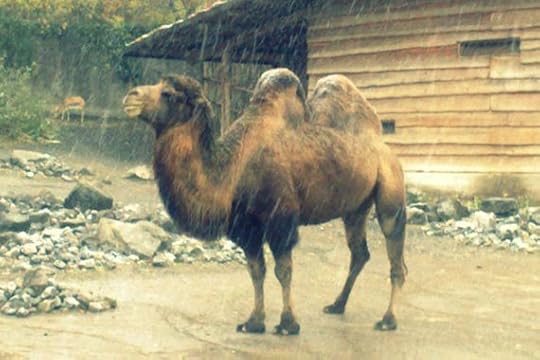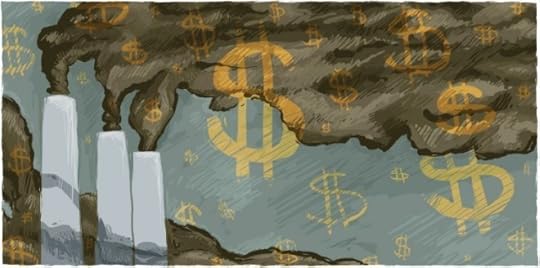Gernot Wagner's Blog, page 5
March 18, 2015
March 11, 2015
Climate Shock in under 90 seconds
Think of the atmosphere as a giant bathtub. There’s a faucet—emissions from human activity—and a drain—the planet’s ability to absorb that pollution. For most of human civilization and hundreds of thousands of years before, the inflow and the outflow were in relative balance. Then humans started burning coal and turned on the faucet far beyond what the drain could handle. The levels of carbon in the atmosphere began to rise to levels last seen in the Pliocene, over three million years ago.
What to do? That’s the question John Sterman, an MIT professor, asked two hundred graduate students. More specifically, he asked what to do to stabilize concentrations of carbon dioxide in the atmosphere close to present levels. How far do we need to go in turning off the faucet in order to stabilize concentrations? Here’s what not to do: stabilizing the flow of carbon into the atmosphere today won’t stabilize the carbon already there at close to present levels. You’re still adding carbon. Just because the inflow remains steady year after year, doesn’t mean the amount already in the tub doesn’t go up. Inflow and outflow need to be in balance, and that won’t happen at current levels of carbon dioxide in the tub (currently at 400 ppm) unless the inflow goes down by a lot.
That seems like an obvious point. It also seems to get lost on the average MIT graduate student, and these students aren’t exactly 'average'. Still, over 80 percent of them in Sterman’s study seem to confuse the faucet with the tub. They confuse stabilizing the inflow with stabilizing the level.
What this video to avoid making the same mistake:
Excerpted from Climate Shock .
March 10, 2015
Climate Shock in under 90 seconds

What to do? That’s the question John Sterman, an MIT professor, asked two hundred graduate students. More specifically, he asked what to do to stabilize concentrations of carbon dioxide in the atmosphere close to present levels. How far do we need to go in turning off the faucet in order to stabilize concentrations? Here’s what not to do: stabilizing the flow of carbon into the atmosphere today won’t stabilize the carbon already there at close to present levels. You’re still adding carbon. Just because the inflow remains steady year after year, doesn’t mean the amount already in the tub doesn’t go up. Inflow and outflow need to be in balance, and that won’t happen at current levels of carbon dioxide in the tub (currently at 400 ppm) unless the inflow goes down by a lot.
That seems like an obvious point. It also seems to get lost on the average MIT graduate student, and these students aren’t exactly 'average'. Still, over 80 percent of them in Sterman’s study seem to confuse the faucet with the tub. They confuse stabilizing the inflow with stabilizing the level.
What this video to avoid making the same mistake:
Excerpted from Climate Shock.
March 9, 2015
CNBC interview: Don’t stick it to the man, stick it to CO2
Gernot Wagner, co-author of “Climate Shock” and lead senior economist of the Environmental Defense Fund, says we shouldn’t ban CO2, but price the climate damage appropriately.
March 4, 2015
Harvard Book Store


Climate Shock: The Economic Consequences of a Hotter Planet
March 27th, 2015, 7:00 pm - 8:00 pm
Harvard Book Store, 1256 Massachusetts Ave., Cambridge, MA 02138
Further event details. Further Climate Shock book events.
March 3, 2015
The Economics of Climate Engineering
Introduction:
Unmitigated climate change is extremely costly. Mitigation (the reduction of carbon dioxide and other greenhouse gas emissions at the source) is the only prudent response. While upfront costs can be high, in the long run mitigation is relatively cheap and because it tackles the root cause of the problem, its benefits are permanent and transparent. However, because the effects of mitigation investments are subject to considerable physical and social inertia, they are slow to manifest. Moreover, effective mitigation requires overcoming the well-known “free rider” effect inherent in the most global of global commons problems.
Enter climate engineering in the form of planetary albedo modification, or Solar Radiation Management (SRM). Although it is both cheap and fast, SRM is clearly an imperfect method of countering climate change. Rather than addressing global warming’s root cause, it counteracts its effects with additional pollution.
Full text: “The Economics of Climate Engineering” (March 3, 2015)
Citation:
Moreno-Cruz, Juan B., Katharine L. Ricke, and Gernot Wagner. “The Economics of Climate Engineering.” Opinion Article, Geoengineering Our Climate Working Paper and Opinion Article Series (2015).
March 2, 2015
Will Camels Roam Canada Again?

 Joel Bez/Flickr[/caption]
Joel Bez/Flickr[/caption]You are cruising down the highway at 65 miles per hour, reading a book in your self-driving car. Your life is in the hands of a machine—an eminently benevolent one. Meanwhile, in the lane next to you, an 18-wheeler using decidedly last-century technology—relying on a fallible human driver—appears to be swerving your way.
Your car’s computer is on the case. Equipped with orders of magnitude more computing power than the Apollo moon lander, it determines with all the confidence it can muster that there’s a greater-than-50-percent chance—it’s “more likely than not”—that the truck is about to hit you.
You may want to look up from your book. More importantly, you want to know with certainty that your onboard computer will hit the brakes, even if there’s a 49-percent chance that doing so will be a false alarm.
If, instead of “more likely than not,” the danger were “likely,” “very likely,” or even “extremely likely,” the answer would be clearer still. Even if there’s a 95-percent probability of a crash, there’s still a 1-in-20 chance that nothing will happen—but no one would gamble their life on those odds. Your car’s computer hopefully will have engaged the anti-lock braking systems already.
A perfect self-driving car doesn’t exist yet, nor has the world solved global warming. But it’s surprising that, by the standards that we’d expect in a car to keep its occupants safe, the governments of the world haven’t stepped on the brakes to avoid planetary-scale global warming disaster—a 100-year-storm hitting New York every other year, frequent and massive droughts, inundated coastal cities. In 1995, the Intergovernmental Panel on Climate Change declared that it was “more likely than not” the case that global warming was caused by human activity. By 2001, it had progressed to “likely.” By 2007, it was “very likely.” By 2013, it was “extremely likely.” There’s only one step left in official IPCC lingo: “virtually certain.”
But we can’t possibly want to wait for that. The 1995 declaration of “more likely than not” should have been plenty to convince us that keeping up the status quo—for two more full decades, by now—was the wrong call. Of course, the world’s systems of governance don’t operate as slickly as an electric engine or an automatic driving algorithm dreamed up by the world’s best engineers. They’re a veritable mess; the technical political-science term used in the context of the climate, "regime complex," doesn’t sound much better.
The problem at hand is similarly messy: There’s no single technology to rescue the world from hitting the global-warming wall. It takes channeling the actions of seven billion individuals who can’t be counted on to do the right thing voluntarily. Changing policy, in turn, takes votes: votes against a system that is pretending to be doing just fine speeding along at 65 miles an hour.
Opinions differ on whether the 1997 Kyoto Protocol that followed on the heels of the “more likely than not” determination has had a significant impact on global emissions. No one would say that it was close to enough. There are hopeful signs in some places, but if anything, the world has since been speeding up on its collision course rather than slowing down.
So how certain does science have to be for the world to act?
Continue reading on The Atlantic.
March 1, 2015
University of Oxford

Smith School of Enterprise and the Environment, University of Oxford: “Climate Shock: The Economic Consequences of a Hotter Planet”
12 March 2015, 5:00 pm – 6:15 pm
Herbertson Room, OUCE, South Parks Road, Oxford, OX1 3QY
Most everything we know about climate change is bad. Most everything we don’t know makes it worse. Deep-seated uncertainty — often seen as an excuse for inaction — is, in fact, the best justification yet for strong, reasoned action. In this seminar Gernot Wagner will present his new book “Climate Shock” and explore tail risks, Black Swans and ‘unknown unknowns’ to argue why to act, and explores what would happen if we don’t. In particular, as much as the ‘free rider’ effects prevents us to take reasoned action today, the ‘free driver’ effect seems to lead us down the road to a geo-engineered planet.
Further Climate Shock book events, including in the UK.
February 28, 2015
University of Bristol

“Climate Shock: The Economic Consequences of a Hotter Planet”
10 March 2015, 7:30 pm
At-Bristol, Anchor Road, Bristol, BS1 5DB
Presented by Bristol Festival of Ideas in association with the University of Bristol’s Cabot Institute and Bristol 2015.
This event is free to attend and open to all but you must register for a ticket. Further Climate Shock book events, including in the UK.
February 25, 2015
How to steer clear of the looming climate shock



Two quick questions:
Do you think climate change is an urgent problem?
Do you think getting the world off fossil fuels is difficult?
If you answered “Yes” to both of these questions, welcome. You’ll nod along, occasionally even cheer, while reading on. You’ll feel reaffirmed.
You are also in the minority. The vast majority of people answer “Yes” to one or the other question, but not both.
If you answered “Yes” only to the first question, you probably think of yourself as a committed environmentalist. You may think climate change is the issue facing society. It’s bad. It’s worse than most of us think. It’s hitting home already, and it will strike us with full force. We should be pulling out all the stops: solar panels, bike lanes, the whole lot.
You’re right, in part. Climate change is an urgent problem. But you’re fooling yourself if you think getting off fossil fuels will be simple. It will be one of the most difficult challenges modern civilization has ever faced, and it will require the most sustained, well-managed, globally cooperative effort the human species has ever mounted.
If you answered “Yes” only to the second question, chances are you don’t think climate change is the defining problem of our generation. That doesn’t necessarily mean you’re a “skeptic” or “denier” of the underlying scientific evidence; you may still think global warming is worthy of our attention. But realism dictates that we can’t stop life as we know it to mitigate a problem that’ll take decades or centuries to show its full force. Look, some people are suffering right now because of lack of energy. And whatever the United States, Europe or other high emitters do to rein in their energy consumption will be nullified by China, India and the rest catching up with the rich world’s standard of living. You know there are trade-offs. You also know that solar panels and bike lanes alone won’t do.
The big trade-off question is how these costs compare with the benefits of action, both because of lower carbon pollution and because of economic returns from investing in cleaner, leaner technologies today.
You, too, are right, but none of that makes climate change any less of a problem. The long lead time for solutions and the complex global web of players are precisely why we must act decisively, today.
What we know is bad, what we don’t is worse
If you are an economist, as we are, chances are you answered “Yes” to the second question. Standard economic treatments all but prescribe the stance of the “realist.” After all, economists live and breathe trade-offs. Your love for your children may go beyond anything in this world, but as economists we are obligated to say that, strictly speaking, it’s not infinite. As a parent, you may invest enormous sums of money and time into your children, but you, too, face trade-offs: between doing your day job and reading bedtime stories, between indulging now and teaching for later.
Trade-offs are particularly relevant on an average, national or global level. And they are perhaps nowhere more apparent on the planetary scale than in the case of climate change. It’s the ultimate battle of growth versus the environment. Stronger climate policy now implies higher, immediate economic costs. Coal-fired power plants will become obsolete sooner or won’t be built in the first place. That comes with costs, for coal plant owners and electricity consumers alike. The big trade-off question, then, is how these costs compare with the benefits of action, both because of lower carbon pollution and because of economic returns from investing in cleaner, leaner technologies today.
Economists often cast themselves as the rational arbiters in the middle of the debate. Our air is worse now than it was during the Stone Age, but life expectancy is a lot higher, too. Sea levels are rising, threatening hundreds of millions of lives and livelihoods, but societies have moved cities before. Getting off fossil fuels will be tough, but human ingenuity — technological change — will surely save the day once again. Life will be different, but who’s to say it will be worse? Markets have given us longer lives and untold riches. Let properly guided market forces do their magic.
There’s a lot to be said for that logic. But the operative words are “properly guided.” What, precisely, are the costs of unabated climate change? What’s known, what’s unknown, what’s unknowable? And where does what we don’t know lead us?
That last question is the key one: Most everything we know tells us climate change is bad. Most everything we don’t know tells us it’s probably much worse.
Stick it to carbon
“Bad” or “worse” doesn’t mean hopeless. In fact, no prediction of climate outcomes or damages can stand without being prefaced by a version of the words unless we act. We don’t venture predictions only to see them become true. We talk about where unfettered economic forces may lead in order to guide them in a more productive, better direction. And guide we can.
Increasingly intense hurricanes, more floods, more droughts, not to say anything of rising temperatures and rising seas are what we know is happening and will continue to happen. Tallying those effects — at least the bits we can put a dollar figure on — results in a minimum cost of $40 per ton of carbon dioxide we pump into the atmosphere today. But on average, the world isn’t considering anything close to these costs. The average global price is closer to negative $15 per ton, considering the massive fossil fuel subsidies in many countries.
None of that yet includes the truly frightening low-probability events. There’s a huge difference between a likely sea-level rise of 0.3 to 1 meters (1 to 3 feet) by the end of this century and eventual possible extremes of 20 meters (66 feet) or more in future centuries. And it’s debatable whether we can describe any of these extreme scenarios as “unlikely” or “low probability” to begin with. By our own, conservative calculations, there’s about a 1-in-10 chance of eventual global average warming in excess of 6 C (11 F), something that can be described only as “catastrophic” for society as we know it.
It would be easy to conclude that capitalism is the problem. Capitalism is indeed at the core of the problem. Or rather: misguided market forces are.
Far from posing a fundamental problem to capitalism, it’s capitalism, with all its innovative and entrepreneurial powers, that is our only hope of steering clear of the looming climate shock.
One seeming solution would be to simply change our ways — voluntarily change our behavior to be greener. If only we slowed down, went back to the land, and generally did more with less, climate change would be a thing of the past. Not quite. The math on voluntary action simply doesn’t add up. And the calculus of changing capitalism as we know it — however desirable that may be as an independent goal — is daunting, to say the least. It also confuses the issue.
Some, like author Naomi Klein, call for “taxing the rich and filthy.” That’s a nice turn of phrase. One might agree that we probably should be taxing the rich more. But that’s a different problem entirely. First and foremost, we ought to be taxing the filthy. Instead of “sticking it to the man,” the point is to stick it to carbon.
Far from posing a fundamental problem to capitalism, it’s capitalism, with all its innovative and entrepreneurial powers, that is our only hope of steering clear of the looming climate shock.
That’s not a call for letting markets run free. Laissez-faire may sound good with the right French accent — in theory. But it can’t work in a situation in which prices don’t reflect the true costs of our actions. Unbridled human drive — erroneously bridled drive, really — is what has gotten us into this current predicament. Properly channeled human drive and ingenuity, guided by a high enough price on carbon to reflect its true cost to society, is our best hope for getting us out.
Published on Ensia.com on February 25th, 2015. Continue reading in Climate Shock, available at booksellers everywhere.
Gernot Wagner's Blog
- Gernot Wagner's profile
- 22 followers



